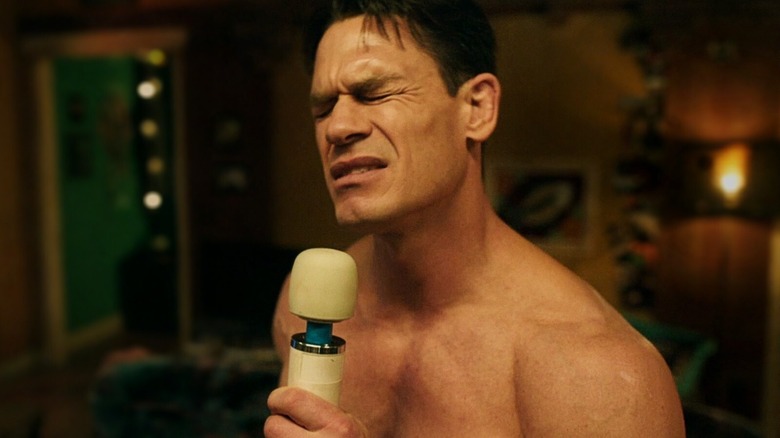
I'm going to be completely frank: I loved "The Suicide Squad," and it was my top movie of 2021, but I initially had no interest in a "Peacemaker" spin-off series. The villainous character, played by John Cena, was nearly irredeemable and a representation of everything that bothers me about America. Writer and director James Gunn has even said Peacemaker's whole deal is "toxic masculinity at its most toxic," which isn't exactly something I want to see in a character that is supposed to be sympathetic. Many other fans I've spoken with have had similar concerns: how am I supposed to root for the guy that did all of those awful things in "The Suicide Squad"?
Gunn is one of my favorite creators, so I gave "Peacemaker" a chance and was blown away by the nuanced approach to tough topics, all under the guise of a foul-mouthed superhero show. "Peacemaker" is its own kind of origin story, but instead of following a brand-new superhero, it's following a lost one who discovers a totally different side to himself. The series is a lesson on radical empathy, forgiveness, and giving people room for redemption. In an America as conflicted as Peacemaker himself, it's a story we need now more than ever.
Warning: Spoilers for "Peacemaker" episodes 1-4 and "The Suicide Squad" from here on out. Content advisory: discussion of child abuse, suicide.
"Peacemaker ... What A Joke."
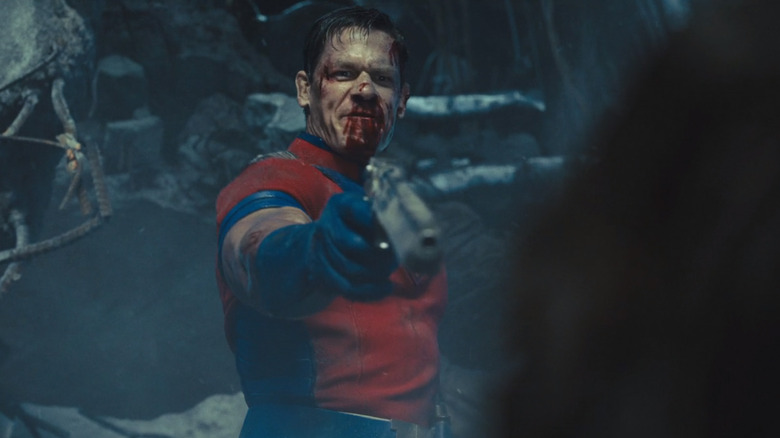
In "The Suicide Squad," Peacemaker is a rude, violent jerk with a bad attitude. Under orders from Amanda Waller (Viola Davis) he kills his hero, Colonel Rick Flag (Joel Kinnaman), and Flag goes one last dig in before he dies, sputtering, "Peacemaker, what a joke." In the movie, Peacemaker really is a total joke of a human being with only tiny moments of humanity, and he does everything he can to hide those from his fellow mercenaries. He's constantly trying to one-up Bloodsport (Idris Elba), he's blindly patriotic to the point of near-fascism, and he's just a total turd. When the credits scene revealed that he had survived being shot by Bloodsport and having an entire building fall on him, I felt a little defeated, like when you find out the killer miraculously got away in a horror movie.
The first episode of "Peacemaker" gives us a version of the character that's already changed in response to what happened in Corto Maltese. Killing his idol did a number on poor Peacemaker (real name Christopher Smith), and leaving the hospital to discover just how alone he was in the world didn't help matters. Later, his "Project Butterfly" teammate Leota Adebayo (Danielle Brooks) describes him as having a "sadness inside him," and that's apparent from the first frame of the series. The bluster and need to constantly prove himself is still there, but the fiery drive is gone from his eyes. Chris has lost faith in his ethos, his motto, and himself.
A Broken Shell Of A Man
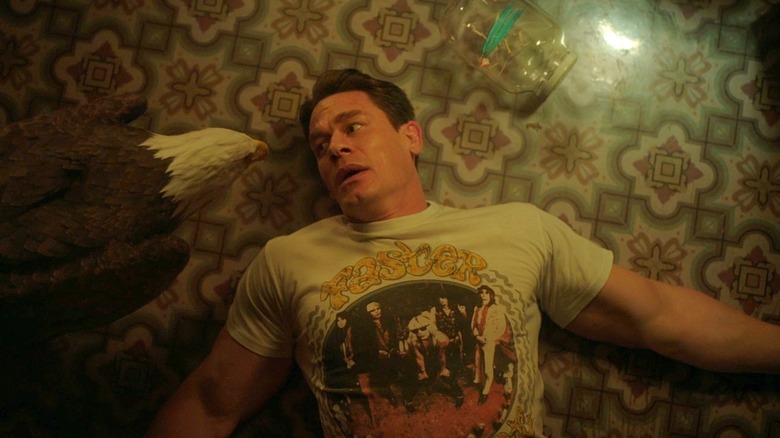
Chris is a mess. His dad, Auggie (Robert Patrick), is a white supremacist supervillain called the White Dragon, and Auggie did everything he could to make his son just like him. In flashbacks during "Peacemaker" episode 4, Auggie forces his school-aged son to kill a man in cold blood, and later to fight his brother while adults bet on them. His brother died as a result of that fight, and it's safe to say that traumatized Chris for life. Not only that, but Auggie is regularly cruel to Chris, and even tells him that the "wrong son died."
Peacemaker has had a horrific upbringing by a hatemonger, but there's still good in him somewhere. Killing Rick Flag made him realize that maybe the blind ideals he had fought for his whole life were a lie, and questioning that leads him on a path of self-discovery.
After Auggie is thrown in prison after being framed for something related to Project Butterfly, Peacemaker goes to talk to him. Adebayo begs him to see that his dad is a monster, but Chris explains that you don't give up on family. Auggie is the only family Chris has, and lifelong abuse is a hard thing to come to terms with. Later, Adebayo explains it to Vigilante (Freddie Stroma): "Chris has a big heart so he wants to find something to love there. But there's nothing to love."
Sins Of The Father
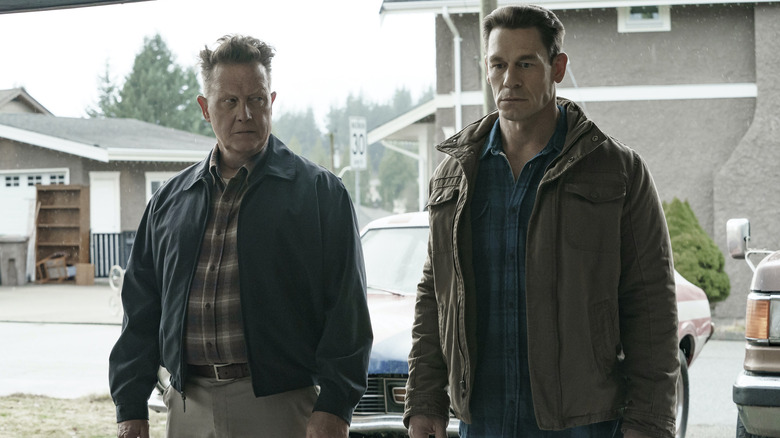
One of the main problems Peacemaker faces upon his return to society is that no one wants to give him a chance. They either assume he's an absolute buttmunch because of his boorish behavior, or they assume he's going to be just like his dad. He's expected to act a certain way, even though he's starting to realize that he doesn't want to be the person he's projected for all of these years. He's not a racist, he's not actually sexist (just confused), and he is deeply empathetic despite forcing himself to be cut off in order to survive.
Chris absolutely has symptoms of Complex Post-Traumatic Stress Disorder, or C-PSTD, including feelings of guilt, self-destructive behavior, detachment, and avoidance. The new trauma of killing Flag has shaken him to his core and opened up old wounds, and his repeated flashbacks of the event are another symptom of PTSD. Chris has been deeply traumatized since childhood, and exists in a world that judges him no matter how he tries to reconcile his childhood.
America has always been divided, but the psychotic fear-mongering of conservative media has driven many of its older white viewers to extremism. People are becoming increasingly radicalized in general, often because they feel misunderstood or lonely. Growth is hard, and learning how to be better is even harder when you're forced to do it on your own. Chris frequently says things the wrong way, though his sentiments are sweet, and it's just proof that he never had proper guidance on social interactions. It's not an excuse, but it is an important explanation. He's not being a jerk just to be a jerk; he's doing it because he doesn't know how else to be.
The Cost Of Loneliness
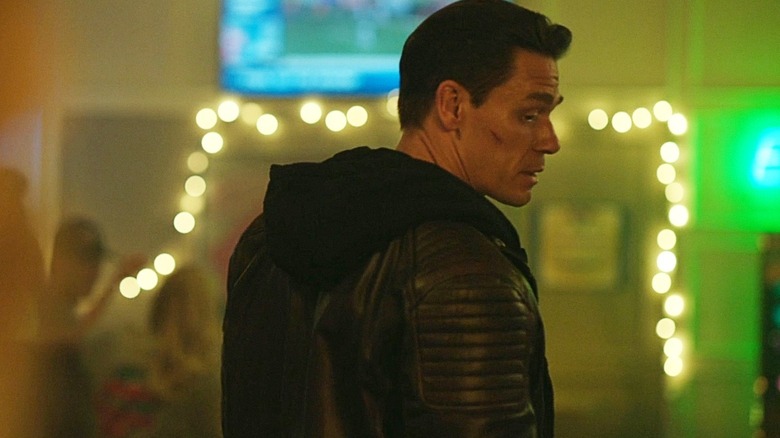
Peacemaker wants to change. He wants to be a better person, and he actively tries to listen to the advice Adebayo gives him. He's heartbroken that everyone hates him, and it would be incredibly easy for him to just fall back into mutual hatred, the way his father always did.
Going against your upbringing is tough, and doubly so when it's an abusive one. Toxic masculinity hurts everyone, but its male victims are the ones that tend to go unrecognized. The suicide rate in America is highest in middle-aged white men, who often are brought up to believe that showing pain is embarrassing, and talking about your feelings is verboten. Many of these men have good in them, but have been abandoned. The confines of patriarchy don't support them becoming fully-realized people, and those who have been hurt by toxic white masculinity have grown tired and frustrated. It's not easy to show empathy to people whose worldview is completely different from your own, especially when some of their beliefs are genuinely harmful.
Adebayo offers Chris something that's unfortunately incredibly rare: radical empathy. Radical empathy is the practice of allowing yourself to empathize with even your enemies, because you realize that we're all just broken humans. Radical empathy has its limits; someone like Auggie, who lacks empathy entirely, is beyond it. But for someone like Chris, who is damaged and lost, it could save his life and help him become a much better man. "Peacemaker" posits that judging people at face value can only ever divide us further, and that failing to give people room to grow can force them back in the other direction.
The Power Of Love
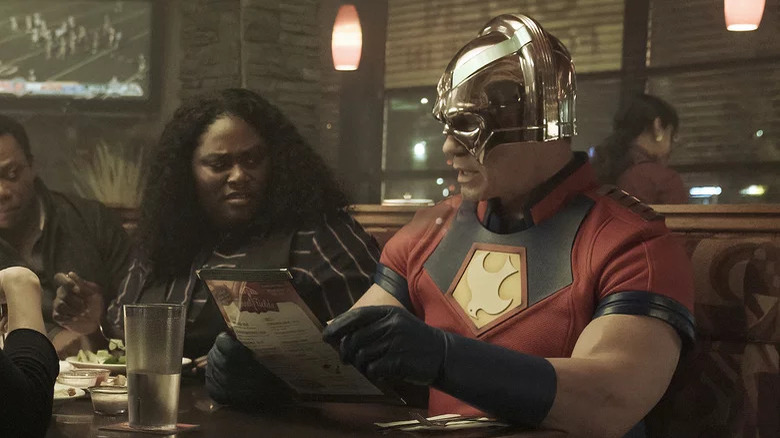
At a press junket for the series, Gunn said that "Peacemaker" was a "love story" between Peacemaker and Adebayo. It's not a romantic love story, but the love story of two people who discover something about themselves while helping the other grow. Their friendship is a powerful force for good, and without Leota, Chris might have reverted back to his more antisocial tendencies. Gunn explained:
"[Leota's] the first person to be nice to him and the first person to laugh with him instead of just at him, not only in this show, but in 'The Suicide Squad' as well. So I think it's more about, if there's anything, I think it's seeing what a relationship could be like from people who disagree adamantly about all sorts of things. The way to maybe initiate change is not by screaming at each other, which only further radicalizes people."
If this all seems a little deep for a show about a guy with a pet eagle and a toilet-seat helmet, don't worry; Gunn's M.O. is putting profound messages alongside profane humor. His career has almost entirely centered on projects that highlight misfits and outcasts, and "Peacemaker" is another in a long line of stories intended to make you think as hard as you laugh. Hopefully we can all learn to give each other a little more room to grow, and help each other change because it can't exist in a vacuum. Radical empathy requires strong boundaries and some tough love, but it can change the world.
New episodes of "Peacemaker" release Thursdays on HBO Max.
Read this next: Joker's Wild: Ranking The Cinematic Versions Of The Clown Prince Of Crime
The post How Peacemaker Gave Me Sympathy for Mr. Kill Guy appeared first on /Film.
0 Comments